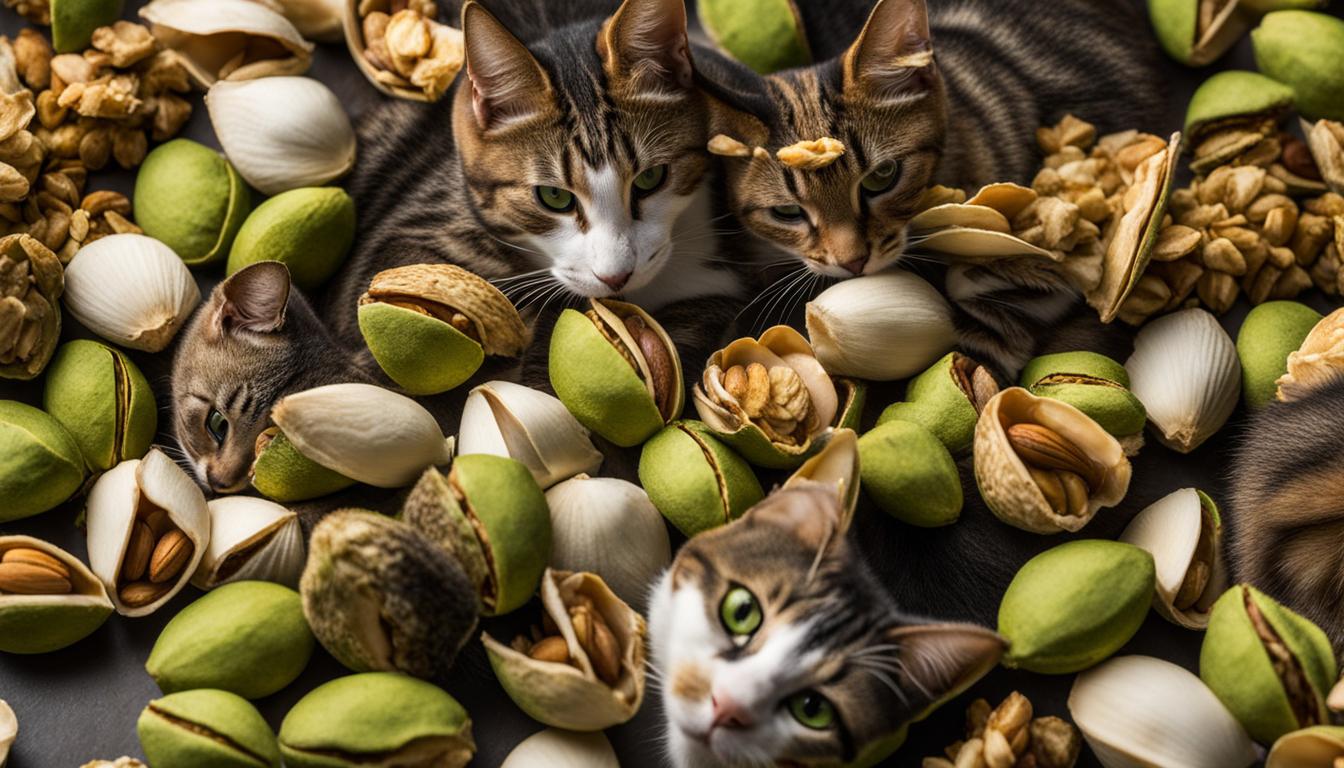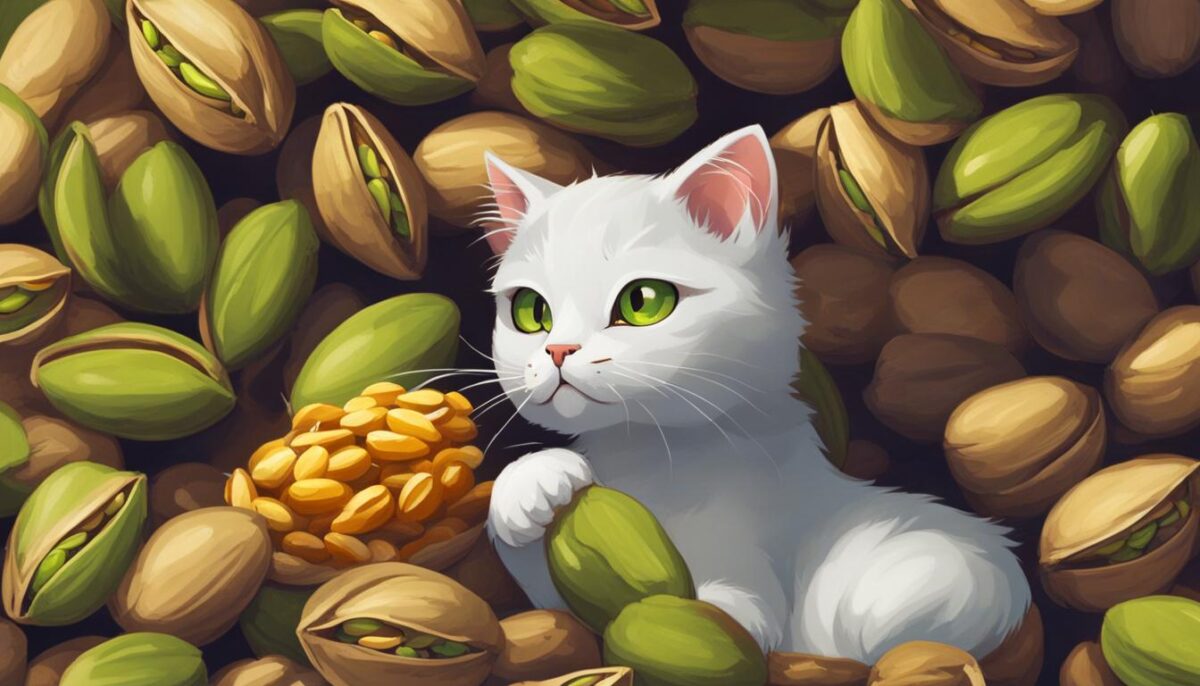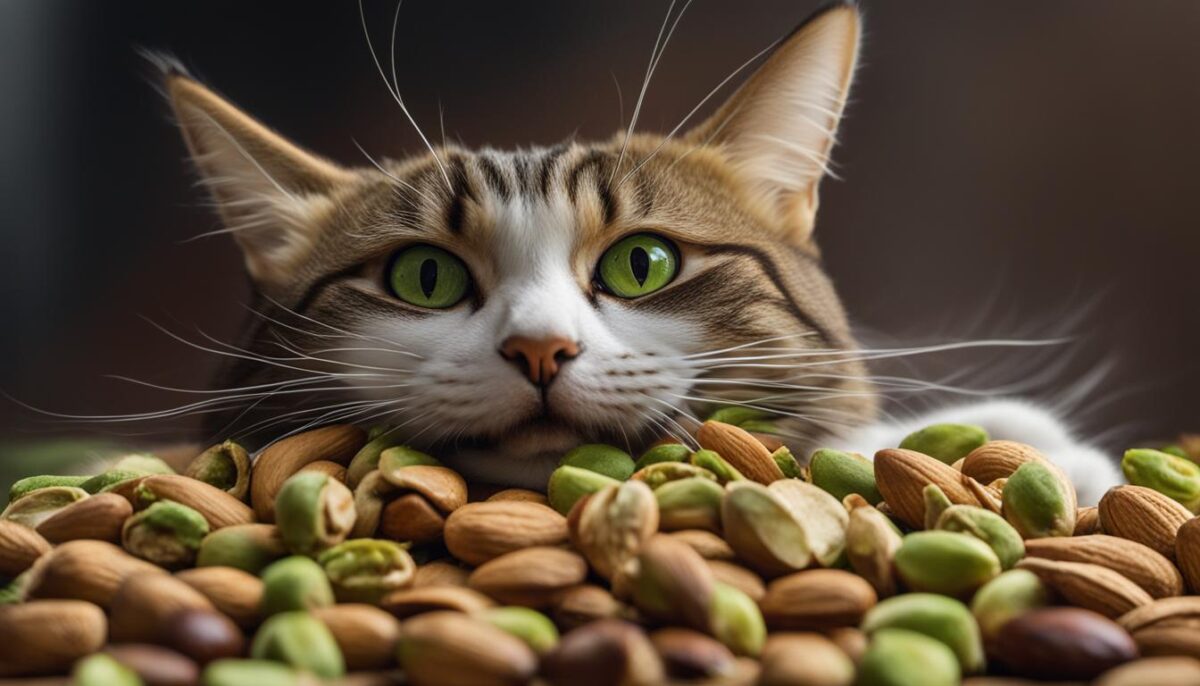Are you curious about whether cats can eat pistachios? As a cat owner, it’s natural to want to share your favorite snacks with your feline friend. However, when it comes to pistachios, there are some important things to consider. Let’s explore whether pistachios are safe for cats and the potential risks they may pose.
Key Takeaways:
- Cats should not eat pistachios as they can cause digestive issues and obesity.
- The high fat content and salted nature of pistachios can be harmful to cats.
- It is best to stick to cat-approved treats and consult with your veterinarian for a balanced diet.
- Other types of nuts, such as almonds and cashews, are also not safe for cats.
- Cats require a balanced diet tailored to their specific nutritional needs.
Are Pistachios Safe for Cats?
While pistachios are not toxic to cats, they are not considered safe for feline consumption. Cats are carnivorous animals, and their digestive systems are not designed to handle certain types of food, including nuts. Pistachios, in particular, can pose dangers to cats and have various health effects.
The Dangers of Cats Eating Pistachios
When cats consume pistachios, the high fat content can lead to gastrointestinal upset, including diarrhea and vomiting. The richness of the nuts can be difficult for a cat’s digestive system to handle, and excessive consumption can even result in pancreatitis, which is a painful inflammation of the pancreas.
Salted pistachios can be particularly harmful to cats due to their high sodium content. Excessive sodium intake can lead to dehydration and electrolyte imbalances. Additionally, the shells of pistachios can pose a choking hazard to cats. It is important to keep pistachios out of your cat’s reach to prevent any potential health risks.
To ensure the well-being of your feline companion, it is best to take precautions and avoid feeding them pistachios altogether. Instead, focus on providing your cat with a balanced diet that meets their specific nutritional needs. Consult with your veterinarian to identify suitable and healthy alternatives to pistachios, such as freeze-dried meats, cat-specific treats, or catnip-infused toys.
| Dangers of Cats Eating Pistachios | Precautions for Cats Consuming Pistachios |
|---|---|
| High fat content can lead to gastrointestinal upset | Avoid feeding pistachios to cats altogether |
| Pancreatitis can occur with excessive consumption | Provide a balanced diet that meets their nutritional needs |
| Excessive sodium intake can cause dehydration and electrolyte imbalances | Consult with a veterinarian for suitable alternatives |
| Shells can pose a choking hazard | Focus on freeze-dried meats, cat-specific treats, or catnip-infused toys |
Alternatives to Pistachios for Cats
If you’re looking for safe and healthy snacks for your furry feline, there are plenty of alternatives to pistachios that are both delicious and nutritious. Cats are obligate carnivores, which means their bodies require a diet primarily consisting of meat. Here are some cat-approved alternatives to pistachios:
- Freeze-Dried Meats: These tasty treats are packed with protein and are a great alternative to pistachios. You can find freeze-dried meats made specifically for cats at pet stores or online.
- Cat-Specific Treats: There are a wide variety of treats available that are specially formulated for cats. These treats often contain high-quality protein and other beneficial ingredients.
- Catnip-Infused Toys: Catnip is a natural herb that many cats love. You can find toys infused with catnip that provide both entertainment and a safe snack for your feline friend.
It’s important to remember that any treats or snacks you give to your cat should be in moderation and should not replace a balanced diet. Consult with your veterinarian to ensure that you are providing your cat with the best nutrition possible.
The Benefits of Cat-Specific Treats
Cat-specific treats offer several advantages over human food or other snacks. These treats are formulated to meet the nutritional needs of cats and often contain a higher percentage of protein compared to other treats. They also come in a variety of flavors and textures, providing enrichment and stimulation for your cat’s taste buds.
| Treat Type | Protein Content | Key Ingredients |
|---|---|---|
| Freeze-Dried Meats | Approximately 80% | High-quality meat, no fillers or artificial additives |
| Cat-Specific Treats | Varies, but typically higher than other treats | Various, depending on the specific treat |
| Catnip-Infused Toys | N/A (no nutritional value) | Contains catnip, which can provide mental and physical stimulation |
“Cat-specific treats are a great way to reward your cat and provide them with a safe and nutritious snack. It’s important to choose treats that are specifically formulated for cats to ensure they are getting the right balance of nutrients.”
The Risks of Cats Eating Pistachios
While pistachios are not toxic to cats, they do pose several risks if ingested. The high fat content in pistachios can lead to gastrointestinal upset, including diarrhea and vomiting. In some cases, cats may also experience pancreatitis, a painful condition that causes inflammation of the pancreas. Salted pistachios can be particularly dangerous for cats, as excessive sodium intake can lead to dehydration and electrolyte imbalances. Additionally, the shells of pistachios can pose a choking hazard. It is important to keep pistachios out of your cat’s reach to prevent any potential health risks.
According to veterinary experts, the fat content of pistachios can be difficult for a cat’s digestive system to handle. Cats have a limited ability to break down and metabolize fat, making them more susceptible to digestive issues when consuming foods high in fat. This can result in uncomfortable symptoms such as diarrhea and vomiting. In some cases, the consumption of pistachios can even lead to pancreatitis, a serious condition that requires immediate veterinary attention.
The sodium content in salted pistachios is another concern for cats. Cats have a low tolerance for salt, and excessive sodium intake can lead to dehydration and electrolyte imbalances. Symptoms of sodium toxicity in cats may include increased thirst, excessive urination, and even seizures. It is important to remember that even unsalted pistachios can still contain a significant amount of natural sodium, which can be harmful to cats if consumed in large quantities.
| Risk | Description |
|---|---|
| Gastrointestinal Upset | Pistachios can cause diarrhea and vomiting in cats due to their high fat content. |
| Pancreatitis | The consumption of pistachios can lead to inflammation of the pancreas, resulting in a painful condition known as pancreatitis. |
| Sodium Toxicity | Excessive sodium intake from pistachios, especially salted ones, can cause dehydration and electrolyte imbalances in cats. |
| Choking Hazard | The shells of pistachios can pose a choking hazard to cats if ingested. |
To ensure the well-being of your feline friend, it is best to avoid feeding them pistachios altogether. Instead, focus on providing a balanced diet that meets their specific nutritional needs. Consult with your veterinarian for guidance on choosing appropriate treats and snacks for your cat, and always prioritize their health and safety when it comes to their diet.
Can Cats Eat Other Types of Nuts?
While pistachios are not safe for cats to eat, it’s important to know that many other types of nuts are also unsuitable for feline consumption. Here’s a breakdown of some commonly asked questions about cats and other nuts:
Can Cats Eat Almonds?
No, cats should not eat almonds. Almonds can be difficult for cats to digest and may cause digestive upset, including stomach pain, diarrhea, and vomiting. In addition, almonds can be a choking hazard for cats due to their hard texture and size.
Can Cats Eat Cashews?
No, it is not recommended to feed cashews to your cat. Cashews are high in fat, which can lead to gastrointestinal issues and weight gain in cats. The high fat content can be difficult for a cat’s digestive system to handle and may cause digestive upset.
Can Cats Eat Walnuts?
No, walnuts are not safe for cats to eat. Walnuts contain a substance called juglone, which can be toxic to cats if ingested. Symptoms of walnut toxicity in cats may include vomiting, diarrhea, weakness, tremors, seizures, and difficulty breathing.
Can Cats Eat Pecans?
No, pecans should not be given to cats. Pecans are high in fat and can be difficult for a cat’s digestive system to process. Additionally, the size and shape of pecans can pose a choking hazard for cats. It’s best to avoid feeding your cat any type of nut and stick to a diet specifically formulated for their nutritional needs.
Remember, cats have unique dietary requirements, and it’s important to provide them with a balanced diet that meets their specific nutritional needs. If you have any questions or concerns about what foods are safe for your cat to eat, it’s always best to consult with your veterinarian.
The Importance of a Balanced Diet for Cats
Providing your cat with a balanced diet is essential for their overall health and well-being. Cats are obligate carnivores, meaning their bodies are specifically designed to thrive on a diet that is primarily composed of meat. A balanced cat diet consists of high-quality protein, essential amino acids, vitamins, and minerals that cater to their unique nutritional needs.
Feeding your cat a balanced diet helps ensure they receive the necessary nutrients for optimal growth, development, and maintenance of their body functions. It supports their immune system, helps regulate their weight, and promotes healthy digestion. By offering a well-rounded diet, you can help prevent nutritional deficiencies and reduce the risk of health issues such as obesity, diabetes, and urinary tract problems.
Key Components of a Balanced Cat Diet
A balanced cat diet should primarily consist of commercially available cat food that is formulated to meet their specific nutritional requirements. These diets are carefully designed to provide the ideal balance of protein, fats, carbohydrates, vitamins, and minerals. It is important to choose cat food that is appropriate for your cat’s age, activity level, and any specific health concerns they may have.
Additionally, it is essential to avoid feeding your cat foods that are intended for humans, as they may not meet their nutritional needs or contain ingredients that can be harmful. Human foods, including pistachios and other nuts, can be high in fat, salt, or other substances that are unsafe for cats. It is always best to consult with your veterinarian for guidance on selecting the appropriate food for your cat and maintaining a balanced diet.
Conclusion
In conclusion, pistachios are not safe for cats to eat. While they may seem like a tempting snack, pistachios can actually be harmful to your furry friend. They are high in fat, which can lead to digestive issues and even obesity in cats. Additionally, salted pistachios can be particularly dangerous due to their high sodium content.
It is important to prioritize your cat’s health and well-being by providing them with a balanced diet that meets their specific nutritional needs. Instead of feeding them pistachios, focus on offering cat-approved treats that are specially formulated to support feline nutrition. Freeze-dried meats, cat-specific treats, and catnip-infused toys are some examples of safe and healthy alternatives to pistachios.
If you have any doubts or questions about what foods are safe for your cat, it is always best to consult with your veterinarian. They can provide personalized advice and guidance to ensure that you are providing your cat with the best possible care and nutrition. Remember, your cat’s health is in your hands, so choose their snacks and meals wisely.
FAQ
Can cats eat pistachios?
No, it is not recommended for cats to eat pistachios. They are high in fat and can cause digestive issues. Salted pistachios can be harmful due to their high sodium content, and the shells can pose a choking hazard.
Are pistachios safe for cats?
No, pistachios are not considered safe for cats to consume. The high fat content can lead to digestive upset and even pancreatitis. Salted pistachios can cause dehydration and other health issues if consumed in excess.
What are the dangers of cats eating pistachios?
Cats can experience digestive issues, such as upset stomach and vomiting, if they consume pistachios. The high fat content can also lead to obesity and pancreatitis. Salted pistachios can cause dehydration and the shells can pose a choking hazard.
What are alternatives to pistachios for cats?
Cats are obligate carnivores and thrive on a meat-based diet. Safe alternatives to pistachios include freeze-dried meats, cat-specific treats, and catnip-infused toys.
Can cats eat other types of nuts?
No, many other types of nuts are not safe for cats to eat. Almonds can cause digestive upset and be a choking hazard. Cashews are high in fat and can lead to gastrointestinal issues. Walnuts can be toxic, especially if they are moldy. Pecans are high in fat and can pose a choking hazard.
Why is a balanced diet important for cats?
Cats require a balanced diet tailored to their specific nutritional needs. A balanced cat diet should include high-quality protein, essential amino acids, vitamins, and minerals to support optimal health.


